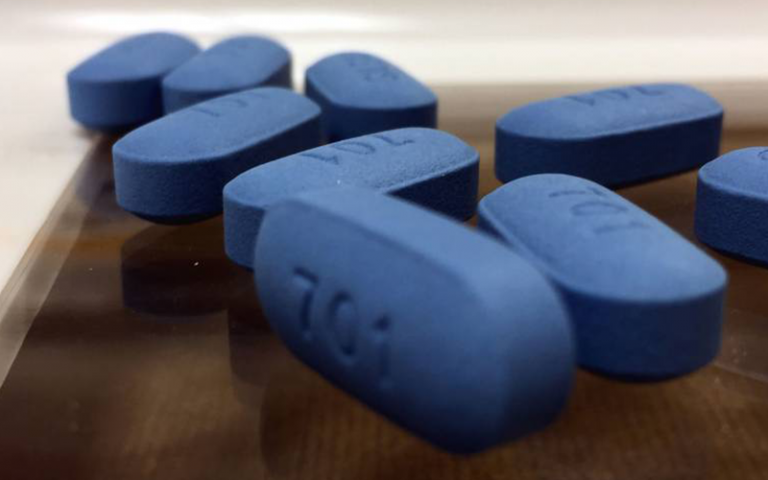Millions of people live healthier, longer lives thanks to policy-changing HIV research
UCL clinical studies have proven that certain HIV drugs prevent users getting the disease and that starting antiretroviral therapy earlier halves later risk of serious disease or death.

20 April 2022
Millions of people around the world are now living longer, healthier lives, or are free from the fear of catching HIV, thanks to findings from two trials co-led by UCL investigators that have changed international clinical guidelines.
HIV cases among men who have sex with men (MSM) in the UK had risen to almost 3,500 per year by 2015. Since 2010, health policy makers had been considering two strategies using antiretroviral therapy (ART) to bring this figure down: ‘test and treat’ approaches, or preventative drugs known as pre-exposure prophylaxis (PrEP).
It was unknown if HIV positive people in the early stages of the disease, whose immune systems were not yet damaged, would benefit from ART. Furthermore, although PrEP had shown promise in clinical studies, nobody knew whether it would work in a real-life setting.
Exploring different approaches
START was a major study of ART effectiveness co-led by Professor Abdel Babiker and colleagues from the MRC Clinical Trials Unit at UCL.
It involved 4,685 HIV positive people from 35 countries, all of whom were at an early stage of infection with a CD4 count (a measure of immune system health) above 500/mm3. A randomly selected half of participants started ART straight away, while the other half were treated after their CD4 count had fallen below 350/mm3. Findings revealed that only 1.8% of those who began ART immediately died or became seriously ill, compared with 4.1% of those who delayed. The authors’ conclusion was clear: everyone diagnosed with HIV should start ART, regardless of CD4 count.
Another major study led by Professors Sheena McCormack and David Dunn (MRC Clinical Trials Unit at UCL), PROUD, involved 544 HIV-negative MSM in England. A randomly selected half received daily PrEP immediately, while the other half deferred for a year. Three HIV infections occurred in the immediate group compared with 20 in the deferred group and there was no difference in other sexually transmitted infections between the groups, showing that men on PrEP did not suffer other consequences as a result of assuming they were protected. This confirmed that PrEP was extremely effective in a real-world setting.
Changing global treatment guidelines
Changes to national and international treatment guidelines swiftly followed these discoveries. The British HIV Association updated its treatment guidelines in 2015 to recommend that people diagnosed with HIV should begin ART immediately, regardless of CD4 count, and it published new PrEP guidance in 2015 with PROUD findings embedded throughout as key evidence. The US Centers for Disease Control and World Health Organization (WHO) guidance also citing PROUD followed suit, the latter stating: “The PROUD study, conducted in the United Kingdom and designed to mimic real-life settings, demonstrated that PrEP is feasible and effective and is not associated with significant changes in behavioural risk.”
WHO data from 2016 shows that the proportion of low- and middle-income countries applying a ‘treat all’ policy for ART as a result of these findings has doubled. According to UNAIDS, in 2019 25.4 million people were accessing ART, up from 6.4 million in 2009. Meanwhile in the UK, the combined impact of ART for prevention and PrEP have caused HIV incidence among MSM to plummet by 71%, leading authors of a 2017 paper in Eurosurveillance to conclude that: “testing of high-risk populations, combined with immediately received ART and a PrEP programme, may make elimination of HIV achievable.”
Research synopsis
Millions of people live healthier, longer lives thanks to policy-changing HIV research
UCL clinical studies have proven that certain HIV drugs prevent users getting HIV (pre-exposure prophylaxis; PrEP), and that starting antiretroviral therapy for treating HIV earlier halves later risk of serious disease or death. Directly influencing international clinical guidelines, the research has changed the futures of millions who would otherwise have caught HIV, become seriously ill, or died.
Research team: Professor Andrew Phillips, Professor Sheena McCormack, Professor David Dunn, Professor Abdel Babiker, Professor Dame Anne Johnson, Professor Sarah Pett, Professor Richard Gilson, Dr Valentina Cambiano and Dr Alejandro Arenas-Pinto.
Links
- Professor Andrew Phillips’ academic profile
- Professor Sheena McCormack’s academic profile
- Professor David Dunn’s academic profile
- Professor Abdel Babiker’s academic profile
- Professor Dame Anne Johnson’s academic profile
- Professor Sarah Pett’s academic profile
- Professor Richard Gilson’s academic profile
- Dr Valentina Cambiano’s academic profile
- Dr Alejandro Arenas-Pinto
- UCL Institute for Global Health
- UCL Faculty of Population Health Sciences
- School of Life & Medical Sciences
- UCL Population Health Sciences REF 2021
Image
- Image caption: Pre-Exposure Prophylaxis (PrEP). Credit: Flickr / NIAID (CC BY 2.0)
 Close
Close

